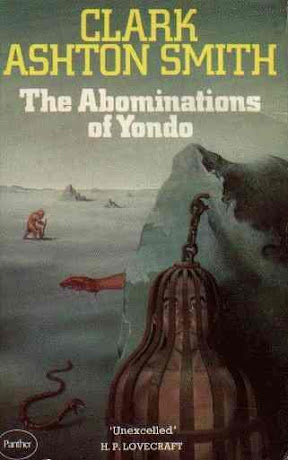OSR Vs. The World

In December, due to a work-related issue, I found myself at a local game store – loading boxes of games into a van with an employee.

This guy was in his late twenties, had medium long hair, and possessed a serious demeanor. Clearly, he was unimpressed with my box-stacking skills as we worked on filling the spaces in the van.
I causally asked him what games he played.
“Mostly miniatures games,” he replied.
“That’s interesting,” I noted, “as I am looking to find someone to teach me how to play Chainmail.”
“Good luck!” he snorted.
“Why do you say that?” I asked.
“That game is over 40 years old!” he responded.
That’s where I left it.

Chainmail, for people who don’t know, is the miniatures game that D&D grew out of. The people who invented D&D were originally invested in playing Napoleonic-era war games with miniature toy soldiers. They added medieval combat to the mix, and then “fantasy” elements – monsters, magic, etc. D&D arrived when these fantasy elements took over and people began playing the roles of individual characters in the games. Chainmail is a simple medieval miniatures game with a “fantasy” supplement.
The employee’s dismissive attitude did not exactly shock me. I have encountered others who, for a variety of reasons, cannot believe that “the latest thing” isn’t automatically superior to what preceded it. It’s like a belief in the “myth of progress.” People just have to be smarter and more “advanced” than those that came before them. Games being made now must, by their very nature, be superior to games produced 30-40 years ago and which are now out of print and forgotten. To suggest otherwise is “crazy.” It’s absurd.
As I have looked around the gaming community, I see more indicators of this attitude. There are more than a few people who eagerly get caught up in “the latest thing.” They look forward to it, they are excited about it, and when it finally arrives… they rush to buy it. Once they get bored, the process begins anew. To opt out of this pattern would short circuit a lot of the fun they have with games. They relish being part of the “next new thing” community. They don’t want that train to stop.
For example, I looked at the online writings of one very intense gamer guy I used to know well back in New York. He has, over the years, kept meticulous records of all the games he played since I knew him and his family. At each point in life he was playing “the latest thing.” He never once returned to play an old, or older version of any game. Some of his online friends manifest what I see as the same kind of blank reaction to the OSR. The idea of reverting back to a much earlier model is something they simply cannot understand. To them, it’s like suggesting they start churning their own butter again.
(Side note: Has anyone actually tried making their own butter? Doesn’t it taste better than what you can buy at the store?)
Obviously, many people working in game stores share their kind of perspective. Their livelihood is, after all, dependent on people buying new games and accessories. If everyone says “Nah!” to this, then they are going to be hurt. The OSR clone games – newer games that seek to come as close as they can to the originals – mitigate these financial concern somewhat. After all, you can always sell someone a new clone game. At the same time, I see the folks in the three local game stores I have been to exhibiting a kind of marked indifference to the clones. If they have that stuff for sale at all, they aren’t promoting it. You have to hunt around in the shop to find it, and it’s usually out of stock. But there is a deeper kind of anxiety about, and antipathy towards, the OSR and its informing stance that I detect when I talk to these people. It calls into question this kind of consumerism, and the hopes that drive it, that a lot of people in our society may be unconsciously, and quite deeply, attached to.
I myself understand this kind of RPG consumerist “rainbow chasing.” When I was a teenager, I moved from OD&D (Little Brown Books, plus supplements), to AD&D, and then to Traveller. I kept hoping that the next new game would give me what the old game didn’t. I eagerly anticipated every new release and my hopes always ran high. I never thought, for a moment, that “newer wasn’t better.” What I failed to see was that the solution to my problems and frustration didn’t reside in the game, but in myself. The game companies, as they existed then, profited from my own cherished anticipation that the “next new thing” would solve the problems and give me the experience I was waiting for.
This kind of endless, and always unfulfilled desire is built in to our consumer society. As consumers, it is what we have been trained to do and it’s what we experience. The OSR interests me, in no small part, because it reveals the dissatisfaction people have with this model. It is a “revolution” in that it is revolting against the typical consumer mentality. Instead of buying into the “newer must be better” mentality, it calls this entire model into question. This is, itself, liberating. At its highest point, it opens us up to possibilities beyond mere consumerism.
We must also concede that a yearning nostalgia for the past can be just as crazy as a belief in a utopian future. The “proof of the pudding” is in the actual playing experience. Here is where I believe that the OSR holds its trump cards. Once people actually start playing the oldest versions of the games, or even the clone approximations, the experience they get proves decisive. The old versions are better, faster, more creative and more fun. This can get them to decide to hop off the consumer hamster wheel – and it may prompt them to start to think skeptically about the ultimate viability of, well, other games they have been caught up in playing…







Yup! And when you want to get a Chainmail game going I’ll be happy to show you how we play it in Central PA. I’ve found that it’s so light that you trip over the simplicity. A remarkable game really, with incredible balance and thought.